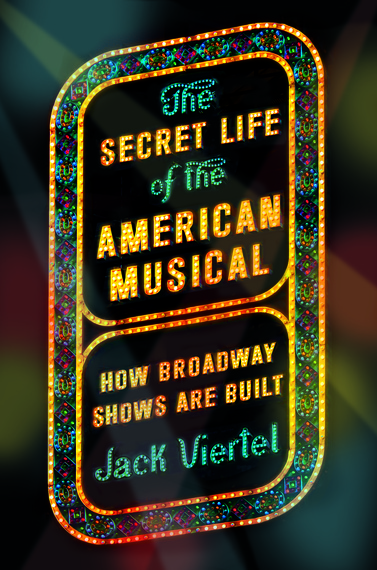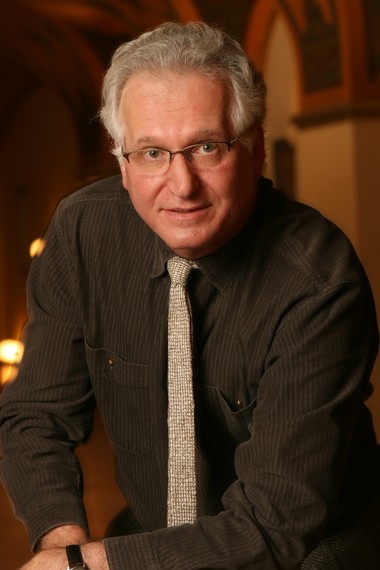
Jack Viertel's "The Secret Life of the American Musical" is not a trove, in actuality, of 'secrets' of the American musical; the author--whose career began as a Los Angeles drama critic in 1980, moving in 1985 to the Mark Taper Forum as dramaturg--merely makes observations about what works and what doesn't. These observations are keen, in part thanks to the several professional perches which Viertel has occupied. Secrets or merely hard-to-divine signposts, purveyors of numerous not-so-good Broadway musicals past and future would do well to heed the advice contained herein.
Viertel hasn't come by his theories as a random observer; he has been a rabid musicalgoer since celebrating his sixth birthday at the Winter Garden in 1954 with Mary Martin as Peter Pan. He was more or less poached from the Taper by Rocco Landesman of Jujamcyn Theatres in 1987 and anointed Creative Director; Landesman is now departed, Viertel is Senior Vice President. Jujamcyn, in order to keep up with the larger and more powerful Shuberts and Nederlanders, has been forced to play a stronger role in developing potential tenants. This has been Viertel's domain, giving him an aisle seat in the creation of important plays and musicals (including Angels in America, The Producers, Hairspray, and much of the work of August Wilson).
What's more, he has had his own little fully-funded musical comedy workshop in which to explore, dissect and reconstruct shows of the past: since 2001, he has served as Artistic Director of City Center Encores! Sixteen years, with three shows a year (plus three additional summer revivals); that's more than fifty vintage musicals he has helped select, staff, assemble and produce. Along the way, he also came up with the concept for two Broadway revues, Jujamcyn's highly lucrative Smokey Joe's Cafe and the recent After Midnight.
Viertel began expounding on his musical theatre theories in 2003, when he started teaching at the Tisch School of the Arts at NYU. His course on "the story of how musicals got made" has developed over the years, and now serves as the basis for his "Secret Life of the American Musical."
What with all this real-life experience--and with his outsized interest in the mechanics of why things work and why other things don't--Viertel clearly knows the territory (as they used to say about another musical music man). He outlines a skeletal system for show construction: the opening number, the "I Want" song, the "Conditional Love Song," the "Noise," the star song, "Tent Poles" that energize the proceedings as intermission time nears, and more.
Let it be said that not all purveyors of musicals--and not all masters of the musical--put stock in said formula; this is often discussed as if it is an established and accepted system, rather than an academically theoretical surmise that can be grafted into one-size-fits-all. Some argue that great musicals more likely come from inspiration, rather than craftsmen with slide rules; but no matter. Creators of musicals will find that heeding Viertel's 'secrets' will provide their work with clarity, definition and entertainment value, among other elements that are all-too-frequently lacking.
The book is chock full of examples, and Viertel repeatedly turns to the best: Gypsy, Guys and Dolls, My Fair Lady, Carousel, South Pacific, Fiddler on the Roof and even Hamilton among them. Somewhat surprisingly, he also frequents items like Hairspray, The Producers and Little Shop of Horrors, explaining that he worked on them so that's his prerogative. (Not coincidentally, his older brother Tom was among the controlling producers of the latter shows.)
While spending most of his time explaining what works, he also offers brief looks at three musicals--Mack & Mabel, Camelot and Wicked--and discusses what doesn't work. Wicked makes a special case; roundly trounced when it opened in 2003, it has worked its way into a blockbuster success. As a point of reference, he notes that the budding theatre professionals in his NYU class back then didn't like the show any more than the critics did. The proportion of Wicked fans has grown, semester by semester, until his current-day students rate the same show, in the same production, as something of a modern classic. Viertel offers a convincing explanation as to why. 
Jack Viertel. Photo: Joan Marcus
"The Secret Life of the American Musical" is aimed less at writers, producers and directors and more at musical theatre enthusiasts. The information, stories and examples are sure to entertain readers while helping to illuminate the joy of musicals well done. Viertel, it turns out, not only knows his subject; he writes incisively, with an undercurrent of sly humor. He also flavors his prose with musical theatre quotes, paraphrases and allusions, which keep things especially breezy.
Those of us who write about Broadway are regularly asked, each time a hopeless new musical opens to dismal response and immediately folds, the same question: The authors, director and producers are all professionals, right? So how is it that they didn't realize how bad the show was? Here's an answer, to paraphrase M. Paroo, girl librarian from River City, Iowa (and if you don't know Marian the Librarian, you're reading the wrong book): "You'll find it in Viertel."
.
The Secret Life of the American Musical: How Broadway Shows Are Built by Jack Viertel is available from Sarah Crichton Books/Farrar, Straus and Giroux
